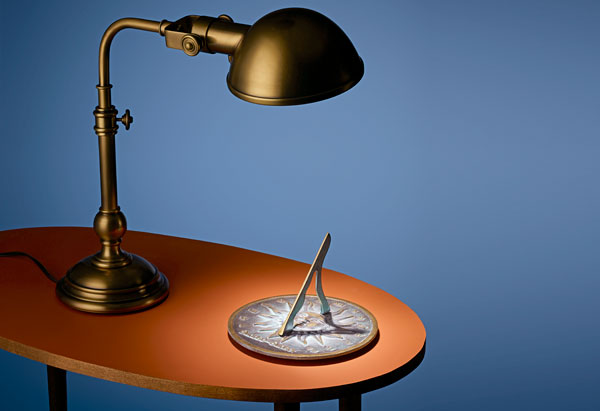
After the rest of her family had turned in and all the household chores were done, Handy would log on to the computer to catch up on e-mails and do research. "Right around midnight, I'd think, I need to go to bed," she says, "but by then I couldn't wind down." Her body clock had lost its rhythm.
For most of human history, working late simply wasn't an option. Fires, candles, and lanterns yielded only a fraction of the light that we get today just from opening the refrigerator door. And during the millennia when sunset meant an end to most activity, we evolved to function on a daily physiological cycle known as a circadian rhythm (from the Latin words circa and dies, meaning "around a day"). At least 10 percent of our genes—genes that assist our most basic bodily operations—are cued to operate by the shifts between light and dark that occur during a 24-hour period. Body temperature dips in the morning and peaks in late afternoon. During the day, the stomach emits hunger signals. After nightfall, heart rate and breathing slow. So much of our biology is ruled by this rhythm that some medicines actually work better at certain times of day.
But human beings now stay awake long past the time our genes are programmed to power down. "Bright light beyond sunset is a very unnatural thing," says Steven Lockley, PhD, a neuroscientist at Brigham and Women's Hospital. Lockley and other experts—from psychologists to cell biologists—worry that our electrified night lives are contributing to many major afflictions.
Take cancer, for example. Last August the journal Cancer Causes & Control published data showing that the countries generating the most light at night have the highest incidence of breast cancer. And so many studies have pointed to the dangers of nighttime wakefulness that the World Health Organization has classified shift work that disrupts the circadian rhythm as a probable carcinogen. One reason may be that late hours starve the body of melatonin, a hormone the brain produces only in darkness. David Blask, MD, PhD, the head of chrono-neuroendocrine oncology at Tulane University School of Medicine, has shown that melatonin is a powerful cancer fighter; his experiments have found that breast cancer cells actually stop growing when bathed in about the same amount of melatonin that the brain manufactures at night. "The hormone basically puts tumors to sleep," says Blask.
The heart ticks to a circadian rhythm, too, says Martin Young, PhD, a cardiovascular scientist at the University of Alabama at Birmingham. In the wee hours before dawn, the heart is slowly preparing itself for the strain of starting the day. "But when your natural rhythm is off, that process doesn't work the way it's supposed to," he says, "which means waking comes as more of a shock to your system." This may partially explain why, in the days following the start of daylight saving time each spring, before our bodies recover that "lost" hour of sleep, the rate of heart attacks shoots up by about 5 percent.
After-hours brightness could even affect your weight. In a study published in October, researchers at Ohio State University exposed one group of mice to a dim light at night, while another group was allowed to experience a standard day-night cycle. Over two months, the first group gained 50 percent more weight than the second group—even though both ate the same amount of food and had similar activity levels. The only difference was that the first group began eating at unnatural times—when their digestive systems were not keyed to metabolize food.
The brain, too, runs on a timetable, and evidence indicates that changes in its natural rhythm can lead to anxiety, cognitive decline, and depression, says Alan Rosenwasser, PhD, a psychology professor at the University of Maine in Orono. Depression and an out-of-whack body clock are an especially dangerous combination because the disease can in turn cause further disturbance in a person's rhythm (so much so that antidepressants alone are capable of resetting the body's clock). Rosenwasser has also discovered a connection between the day-night cycle and addiction: Lab mice forced off a normal schedule actually experience an increased craving for alcohol.
We are just beginning to understand the effects of our extended days, but it's becoming more and more clear that our habit of cheating darkness may lead to a rude awakening. The good news is that it's possible to nudge yourself back to a healthy rhythm.
As for Tamika Handy, she has begun finding ways to whittle down her days and lengthen her nights. By focusing on the tasks she absolutely must accomplish in a 24-hour period—and pruning out the rest—she has shortened her daily to-do list to a manageable length. "When my family is getting ready for bed, I'm no longer running around feeling guilty for all the things I haven't yet accomplished," she says. That sense of satisfaction allows her to relax a little bit. Then, at about 9 P.M., she turns off the television, shuts down the computer, and relaxes with a good book. At 10 P.M., it's lights out.
Next: Follow these simple steps to fix your sleep schedule




